Ashley Judd has recorded a diary of her experience with Rohingya refugees in Bangladesh for Sky News to mark six-months since the start of the crisis.
The US actress and activist is a Goodwill Ambassador for the United Nations Population Fund (UNFPA), the United Nations' reproductive health and rights agency.
:: Saturday 10 February
It's Saturday and we've just arrived in Cox's Bazar, Bangladesh. A sign in my hotel advises guests not to leave the premises after 6pm. I was personally told if I wanted to go somewhere I would need to have an escort. I'm to be accompanied everywhere by a UNFPA employee called Fathema, who is an expert in trauma faced by Rohingya women.
I may go out another night, but not tonight. Tonight, I am preoccupied thinking about 60,000 pregnant women affected by the crisis – 300,000 affected women are of reproductive age.
A total of 78% of the births in the camp are happening in women's shelters, which are often just bamboo and tarps. That's why UNFPA's clean delivery kits are so important. Containing a pair of gloves, a bar of soap, and a razor blade for the umbilical cord, these $5 (£3.60) kits make the difference between life and death for mothers and their newborns.
:: Explained: The Rohingya refugee crisis
:: Sky crew: Harrowing plight of Rohingyas in Myanmar will stay with us
I've been reading up in preparation for the trip and over the past six months 688,000 distraught and traumatised Rohingya have arrived in 26 camps on 3,000 acres and in host communities in Bangladesh.
Within the camps there is a shortage of everything that matters: shelter, food, safe drinking water, sanitation, healthcare, peace of mind, knowledge of where one's loved ones are, or escape from the knowledge that one has left babies, children, and elderly behind in Myanmar, abandoning them by necessity as one fled to save oneself from flames, from hatred, from more rape and murder.
I am very lucky to be here. I understand it is a privilege. My hope is to use this privilege well.
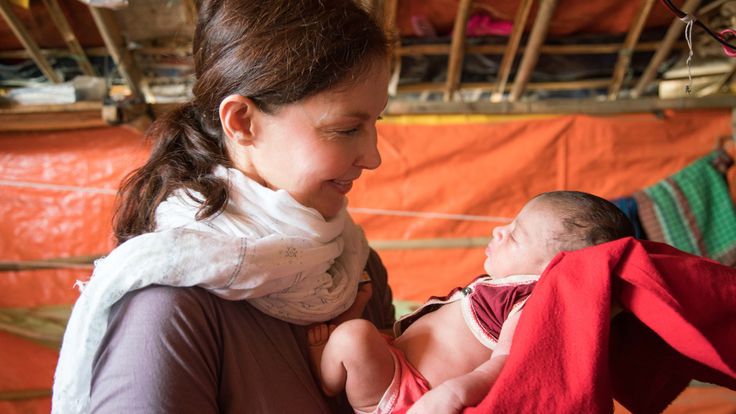
:: Sunday 11 February
Today was my first day in the camps. I visited a UNFPA-supported Women's Friendly Space (WFS) in Lambasia within the Kutupalong extension site, where we spent between four and five hours with the women and girls.
Since August last year, Bangladesh has seen an influx of 688,000 Rohingya. At the peak of the exodus, people clogged the roadside here, coated with mud, barely clad, begging, leaping at cars. Our team say the drive could take as long as four hours back then.
On the way, I discuss with Fathema how vulnerable women in the camps are, even when they go to the toilet.
She tells me the latrines were opened as soon as the camp began to receive Rohingya, back in August. They are few, and they are "overloaded".
I know I will have to use them on my visits, even though I tried to drink my water early in the day to avoid having to go tinkle. It's always a conflict for me. I'd rather just squat somewhere and go, but I have to use the faeces-filled latrines, too.
There is already open defecation, especially the children, who can't wait for long hours to get to, or in the queue for, the latrines. Women and children have to wait after the men, so even if they've been in line men cut in front of them, further driving some not to use latrines.
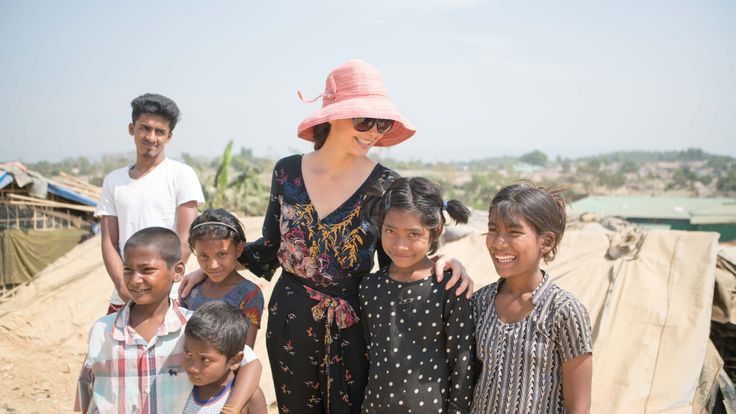
Fathema tells me at the camps there are 19 Women Friendly Spaces – Shanti Khana as Rohingya call them (peace houses) – open from 9am until 4.30pm when the staff, for security and safety reasons, vacate the camps.
They are safe places where women can relax, build peer networks, receive psychosocial support, and hear about the services that are available across the camp from a variety of service delivery groups. There are case workers and case managers, and today we will be starting a garden, and painting the space, so it can really be the women's own, as they want it to look and feel.
At the camp I go straight to the Women Friendly Spaces where I met a little boy who was smiling and playing with three plastic figurines, a lion, a giraffe, and a tiger. I roared, and nestled the lion toward him and he smiled more broadly. The other little girl next to him, however, was blank. She had two little plastic dolls, smaller than my hand, one with a leg popped out.
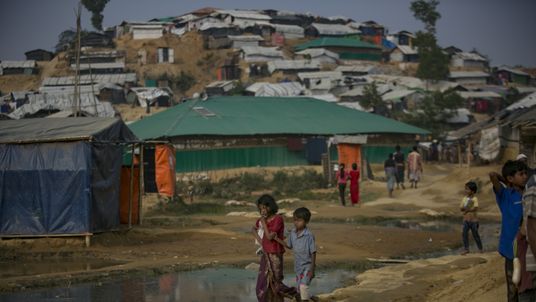
It becomes clear that Rohingya dreams are limited…. their choices are close to zero.Ashley Judd
She was smaller than the boy, unrelated by blood, but both ethnic Rohingya refugees from Myanmar squatting inside the orange-coloured entrance.
Seeing how very little she is, and how sweet his smile, one struggles to put together that they somehow walked 14 days through rain, waist-high mud, and waded through scary canals of water, to arrive at this refugee camp.
A gaggle of girls was in the courtyard. They had yellow and orange tubes of plastic, tied in knots that stuck out of handle ends. In the direct sun we jumped rope, just like girls – eight and nine-year-olds – all over the world jump rope.
Their dresses were filthy and their hair was slick with grease so that their hair was one cohesive piece and stayed in place, not moving as their bodies did.
Before long, there is music, and a woman with lovely round hips is up, smoothly hitching them to one side as her hands twirl to the beat.
Then I am up, too, casting off my UNFPA jacket, sweating again, doing my best south Asian moves.
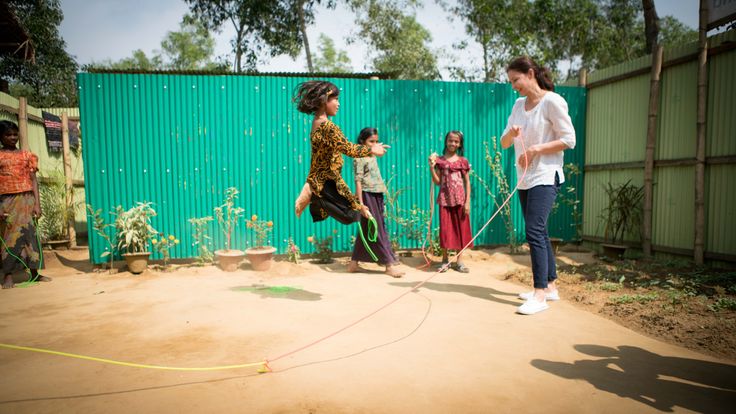
Once I sit, listening takes over, stories of home pouring forth like the sweat on my face, and someone positions a fan to cool me. One woman lost her father and her son in a slaughter. Another lost her husband and had a newborn. She used clothes to wrap up her postpartum belly, and carried her baby. She paid someone to carry her one-year-old and her three-year-old.
In the sessions, they tell me that men may seek to take a child in marriage, saying it's safer than being an unwed girl in this precarious environment. But girls' bodies aren't ready for pregnancy and childbirth.
They tell me they are wary of people who sidle up to a woman or a family with rations, with food, with slick talk, who only want to take the girls to a local hotel to rape them, as has happened with people they know.
Voluntary family planning methods are available to help prevent having another baby right now, in the camp where 34,000 of the women who recently arrived are pregnant, where 170,000 women are of reproductive age. It's safer to give birth in the facility than to do so in the tent, home alone.
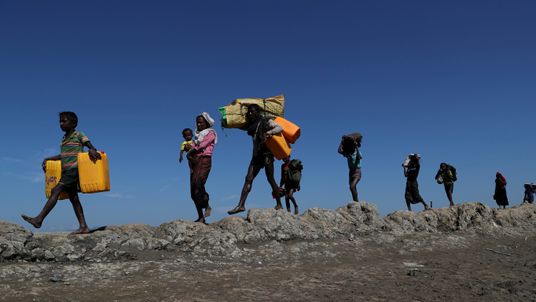
I don't know if they are patient, exhausted, in pain, defeated, or bored. I myself am all of those, and I am curious about it. I can feel in my body and my spirit that the vast fatigue of womankind is upon meAshley Judd
Two sisters tell me of the violence they endured.
Myanmar men came in, taking the young, pretty girls away, raping them. The Rohingya men were hog-tied, hands and feet looped up behind their backs, before they were decapitated, blood spilling from their spinal columns.
Older women had been locked in some room, which the sisters were able to break into by finding something to batter down the door. They fled, these two sisters, to the jungle, where they stayed, until from the jungle they saw their village lit on the fire. Then, directly from the jungle, with nothing, they turned heel and began to run for Bangladesh.
It becomes clear that Rohingya dreams are limited. The world has taught them to be, that their choices are close to zero.
They say they would like to have a sewing machine and yes, a boom box, for the music they love to listen to.
There is a small staff room, where I take my tea, and a psychosocial one-on-one counselling room, with pillows if it's easier for a woman to lie down as she shares the horrors of what has happened to her. The only other room is for the midwife. There is a table for examinations and a poster on the wall.
The Women Friendly Space doesn't have to be much to be everything, to the Rohingya who come here.

My eyes reluctantly sees that four-and-a-half hours have gone by, and to be obedient to the security rules laid out for me, I have to go. I begin to cry.
A child takes a silver ring with etchings off her finger and slips it on to mine. It fits on my wedding finger, which I love. I explain this to her, and say this now means we are responsible for each other. She beams.
Another girl takes the edge of her head scarf and wipes the tears on my face.
I hand my scarf to another teen, and bow my head, asking her to wrap it for me. She does so slowly, confidently, and I am in communion, a holy and sacred place.
My time closes as it began, deep, sustained eye contact with Rohingya women, gentle pressing of our cheeks up against one another, whispered words of "I love you". An elder woman stays seated, and when I kneel to her, she places her hands on my head and says: "Don't weep, daughter. It will be okay."
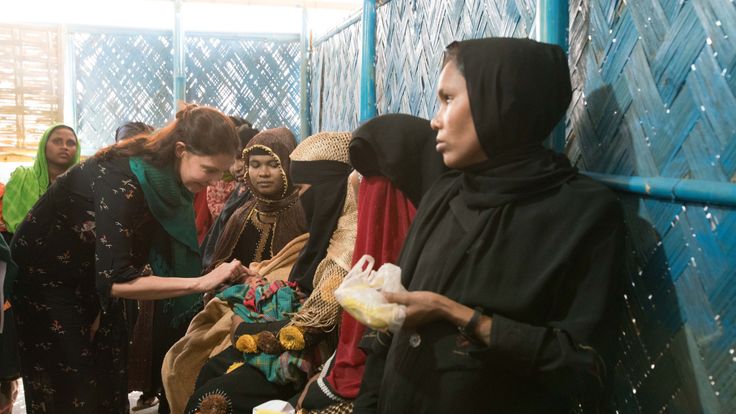
:: Monday 12 February (morning)
Right now, 34,000 of the most recently arrived women are pregnant inside the refugee camp. I'll be meeting some of them today, some who may give birth on the spot.
Midwives have been busy since the Rohingya crisis of August 2017 began. They have screened more than 170,000 women.
About 40,000 women have received antenatal care, and more than 1,500 babies have been born. In the camp, 78% of those have been outside any health facility, in the mum's makeshift shelter of mud or tarp.
We so often don't think of pregnant women in crisis. We somehow think life freezes, and activity other than basic survival halts. But women were pregnant before they fled Myanmar, women get pregnant by their husbands and the men who rape them. Childbirth stops for nothing.
The queue for the maternity clinic is stultifying. It is in three directions and then there are thick, deep, mildly disorderly squares of women pressing against one another outside the physical space, dozens and dozens of more women who wait to be able to join the infernal queue. It is very hot.
Everyone is dressed in layers of black; many are wearing headscarves. I don't know if they are patient, exhausted, in pain, defeated, or bored.
It is here I meet a woman called Ajida.
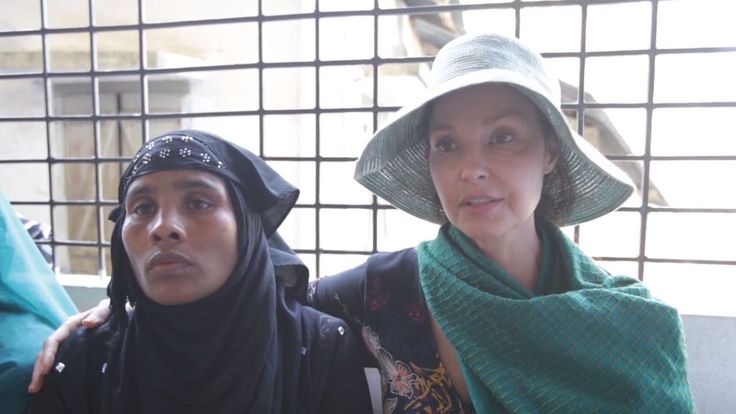
She speaks in bursts. We are at the front of line for maternity service. Two small offices, one to our left and one straight ahead, have little sheets for doors that periodically flutter open, ushering out, and then beckoning in, women like Ajida, a Rohingya refugee who fled Myanmar pregnant.
But Ajida skips her turn, preferring to sit with me. She describes my listening as support.
She tells me the military came and after the slaughtering, they fled. In a boat, they were pursued, and the boat capsized. Ajida's 10-year-old, her seven-year-old twins, and her three-year-old, died.
Later that night, I think about the yearning of missing. I miss my cats. I miss my beloved deceased grandparents. It's universal, I suppose, this missing. It's very human. But I am not sure how to miss four dead children. I am not sure anyone is, except somehow, Ajida, who with her carved face and hand resting on mine, is an expert.
She surprises me by saying the baby hasn't moved in a month. I want to pretend she did not say this, because this news is so bad it can't be true on top of four already dead children.
She says she has a terrible burning and she gestures to the area of her diaphragm, and she explains that the baby is in low slung, off to a side position that is very heavy and hard, and makes it hard for her to move or walk.
I am immediately convinced the baby is stillborn but I can't cope with that, and I relay this hellish information to the maternity clinic UNFPA midwives, who will care for her, who live in premises, who tend to refugee women 24/7.
Later, I get a text from my friend, the singer Bono, asking me what a certain girl's name is, the girl I "married" – the girl who put her ring on my wedding on my finger.
He says he'll sing for her. Instead, I tell him Ajida's name. He responds: "Oh Lord help her. She must have something very special to offer if she made it."
:: Monday 12 February (afternoon)
We went for a drive to see what the camp looks like, particularly the areas where the most recent arrivals are living on dusty exposed mud terraces.
The Rohingya refugee camp is both enormous and small, which is confusing, and that's normal. Refugee camps are very confusing.
Hundreds of thousands of people live on this steep rabbit warren of terraced dirt.
I see sandbags plotted out to make steps for an improbably unused hill that will within days become another Rohingya settlement.
Refugees from Myanmar cross the border and are directed to the UNHCR Transit Centre, where they are counted, given health check-ups, a bit of clean water and nutrition, and an emergency blanket. They stay at the transit centre up to a few days, until they are given a postage stamp area of ground on which to assemble their construction paper-flimsy new home.
There is a consuming, inescapable tension here. Life is suspended. Life is urgent. There is absolutely nothing to do but to try to make sense, in a state of flaming trauma, of chaos, to navigate to an Elderly Friendly Space or a Child Friendly Space or to be in the right line at the right time for a ration of some life-giving supply.
Plotting when to pee, how to poop, maybe when and if to try to wash up a bit, all require exaggerated effort, timing, and risk.
Waiting in line to check in for labour and delivery is boring even when life, the most exciting thing in the world, is emerging. It's unnatural. That's the word. Unnatural. And as such, it is utterly exhausting.
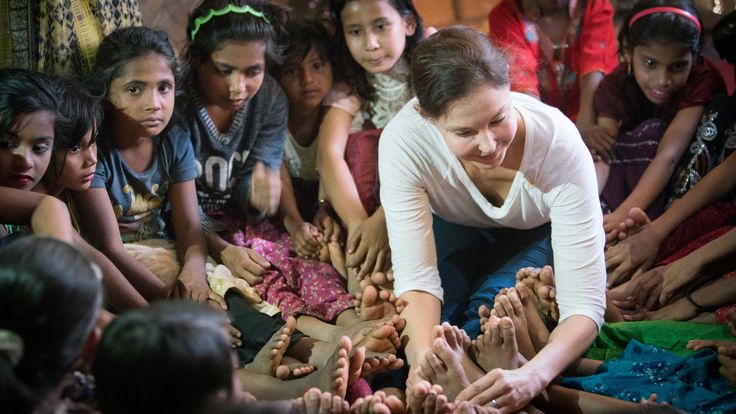
:: Tuesday 13 February
Today we visited a UNFPA Women Friendly Space in Kalamchara where women are safe to do what women do, grouped up, equal amongst equals.
They have their hands on my knees, their foreheads take turns leaning into mine. Sometimes three were speaking at once. I am gently pawed at.
My trip is coming to an end and every now and then it hits me, abruptly, that I am looking into the eyes of a Rohingya, that I am living the news with them, survivors of what many are calling an active ethnic cleansing.
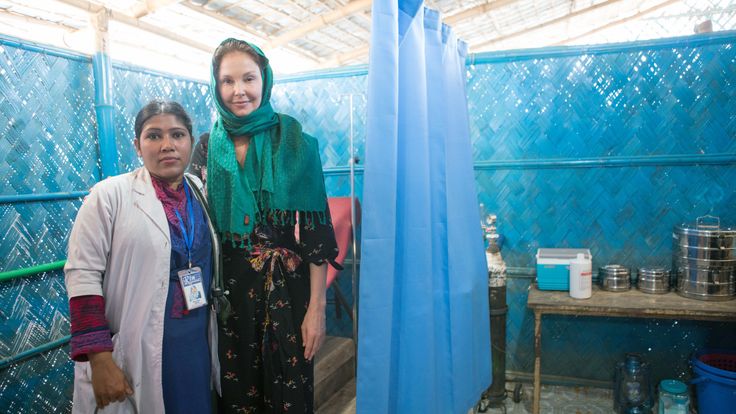
It's stunning to realise I am beholding the eyes of one of the world's most complex humanitarian crises, an old story of ghastly prejudice and control, and possible genocide. Whatever we call it, it is clear we all have to do something about it.
After taking a walk, which itself cuts through throngs while attracting fellow walkers, I taped a video diary for Sky News, which mesmerised people. It was the quietest I ever heard the camp.
Sitting in the car, an old woman begins to gesture to me. I lean forward and she blesses me. An equally, or older, man next to her does the same. I think about how the Rohingya are not bitter, in spite of such trauma. Their capacity for gentleness is a lesson in humanity with which I cannot even begin to grapple.
The old woman begins to tell her story of slaughter back home, raking a finger across throat as if it has been slit, then letting her hands float up uselessly while she lolls her head to one side with eyes closed, signifying death.
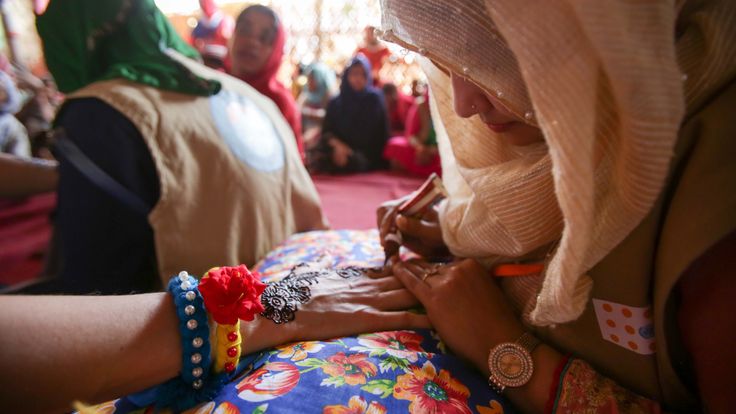
The old man holds his hands forward and "shoots" them in a small arc, showing how many were shot, mowed down, at once. He demonstrates, perfectly, death, over and over.
Later, I shake. Lying in bed, my body involuntary trembles. Sometimes I kick, only aware I have afterwards. I trust this, I know it's vicarious trauma exorcising itself. Eventually, I fall asleep, and sleep 12 hours.
:: Wednesday 14 February
My time in the camp has concluded and as the morning wears on I feel more and more lethargic, more tired. Leaving is intellectually okay, I understand I can't stay, that that is neither my role (to be here full-time) nor how I am most useful.
It's my body that is feeling the departure, as if every minute of the day that passes, every kilometre further from my hundreds of thousands of Rohingya refugee brothers and sisters, tears me down.
It has been enough for me, a survivor of child maltreatment and assault.
Walking through the camp, there is a sudden crash at a low bamboo "gate".
Very small children are inside the courtyard and others outside are straining. From somewhere more deep within, that I cannot see, the littlest of children are apparently being handed Styrofoam containers held together with a single rubber band. Food.
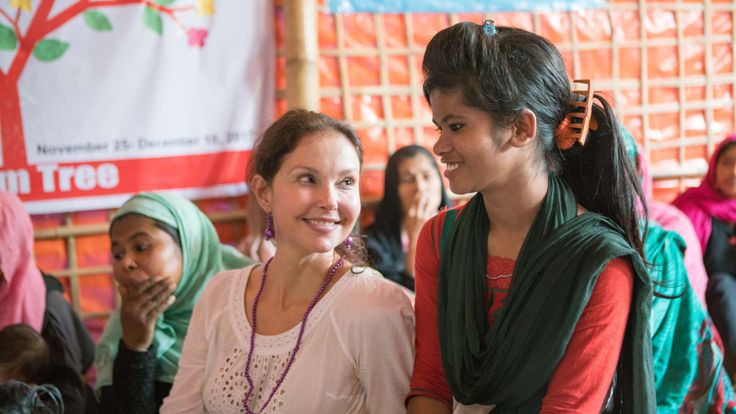
They surge into a dangerous, chaotic crowd. So with my body I create a narrow foot path so those to whom food has been given can safely leave without being trampled on by those rustling, panicking.
It helps, and the crowd somehow briefly respects this introduction of makeshift order. But soon enough it becomes unruly again, and a very small child, maybe two-years-old, is knocked over and trampled.
I lunge at him, scoop him up, and clutch him to me. He hangs on to his Styrofoam box with life-saving food as he clings to me. I walk him swiftly past the worst of the crowd.
More from Opinion
His older sister, a diminutive sylph in a vibrant slash of fabric tied as a sarong, emerges from the mayhem. She takes his hand, and off they set out together, toward what she knows, in spite of her being so terribly young, is the direction of what comprises home in this refugee camp of hundreds of thousands of souls.
I watch them. It's a deeply touching scene. Just before they turn right and down a narrow space – space darkened by an interminable row of tents made from plastic, she and I connect eyes.
I smile. She flashes back at me a smile so replete, I know I will remember the moment for the rest of my life.
[contf] [contfnew] 
Sky News
[contfnewc] [contfnewc]






